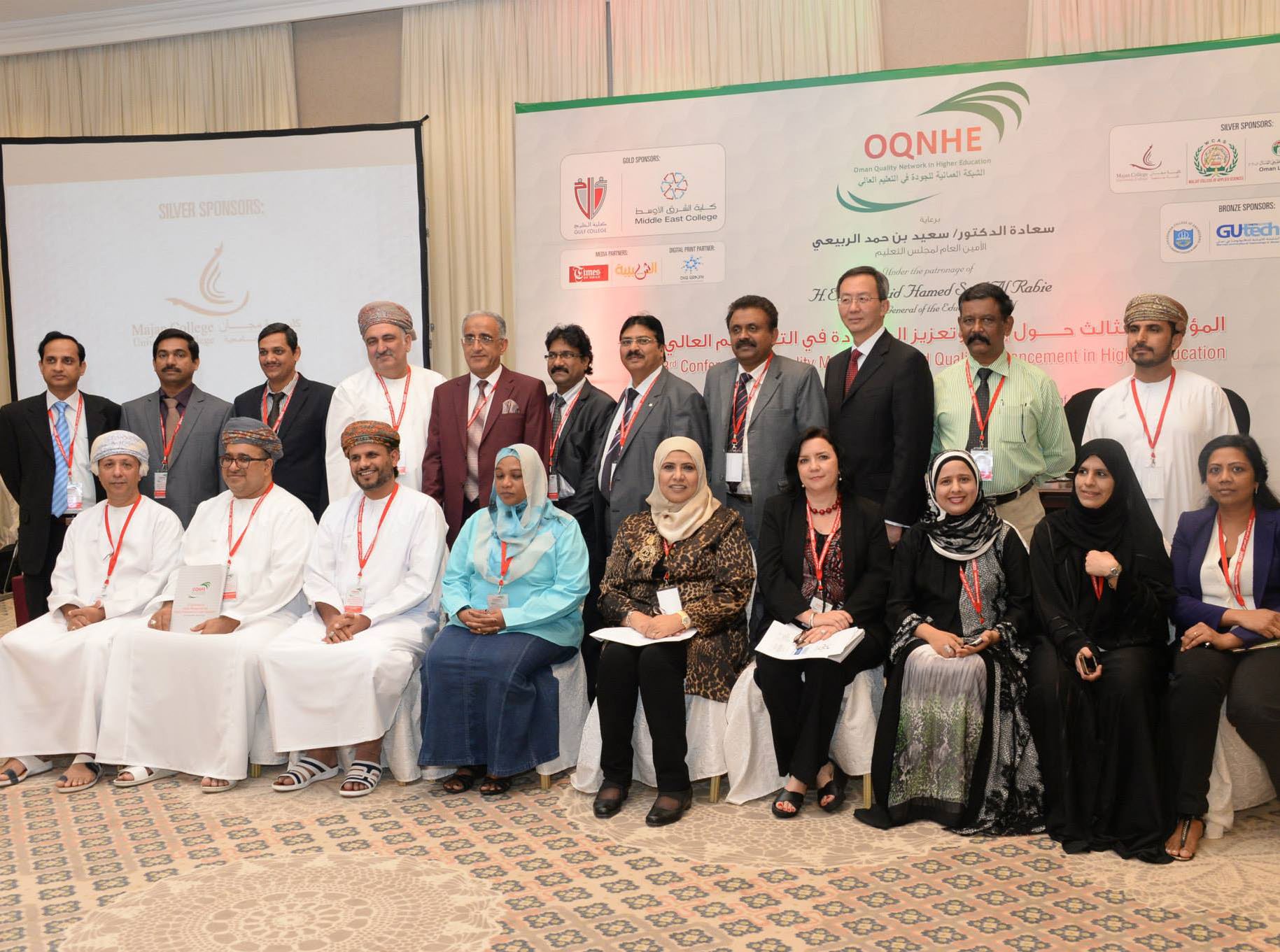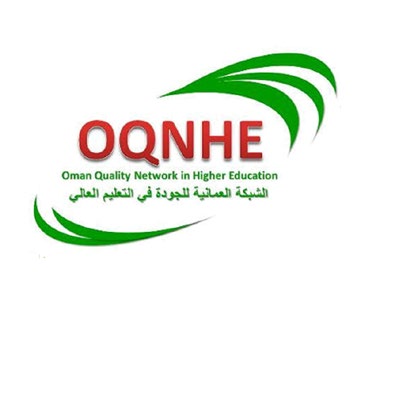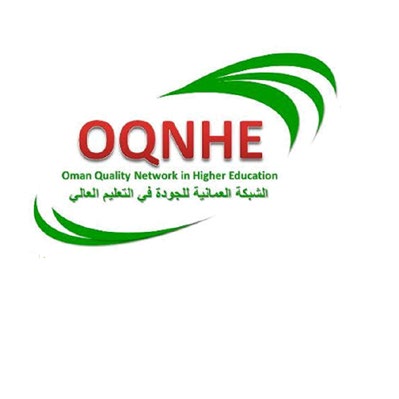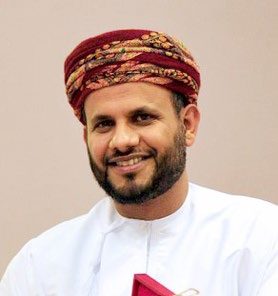Levitra enthält Vardenafil, das eine kürzere Wirkdauer als Tadalafil hat, dafür aber schnell einsetzt. Männer, die diskret bestellen möchten, suchen häufig nach levitra kaufen ohne rezept. Dabei spielt die rechtliche Lage in der Schweiz eine wichtige Rolle.
Oqnhe.om



Issue 5, March 2016
OQNHE 3rd INTERNATIONAL
OQNHE conference, Benchmark, Test Blueprint and more.

Hello friends.
Oman Quality Network in Higher Education is proud to
announce the publication of the fifth issue of its e-newsletter.
This issue provides a glimpse into the activities conducted
by the Network through some articles related to the higher
education sector in Oman.
The Network organized its third international conference on
Quality Management and Quality Enhancement on 24-25
February, 2015 at Crowne Plaza Hotel, Muscat. The Conference
attracted many participants and attendees from the field of
higher education from Oman and abroad.
In line with OQNHE's objective of enhancing the awareness
of quality culture and accreditation in the HEIs in Oman, a
workshop about benchmarking was organized in November
2015 at College of Banking and Financial Studies. The workshop
was conducted by Dr. Lee Sutherland, an expert in management
and implementation of education and training projects.
This issue contains articles focusing on building and monitoring
quality systems and practices from different higher education
institutions in Oman.
For more information about the network and its events, please
visit our website www.oqnhe.om.
Amal Al AamriOQNHE Executive Committee Member


INSIDE THIS ISSUE
Message From Chairperson . 03
OQNHE Workshop . 04
OQNHE Conference . 06
Benchmark or Not . 07
The Rise Of Quality Mentoring At Gulf College . 08
Test Blueprint . 09
Upcoming Events . 11


MESSAGE FROM
CHAIRPERSON
In the past academic year, we held a very
successful conference, the third OQNHE
Conference on Quality Management and Quality
Enhancement in Higher Education on 24 and
On behalf of the OQNHE executive committee,
25, February 2015. I had the opportunity to meet
many of you at the conference and the feedback
I have the honor to introduce to you the fifth issue received both verbally and in writing was extremely
of the OQNHE E-Newsletter. The E-Newsletter is a positive and encouraging. I would like to extend
medium that contributes to our mission of sharing my thanks to all who have contributed and helped
ideas and practices that enhance the quality of to make the conference a success.
higher education institutions. It encourages
collaborative initiatives and exchange of
information on issues that our member institutions
have faced and struggled with. The success During this academic year we are planning to
of this and future issues relies on the support hold a number of workshops for which you will
extended by your institutions. I encourage all of receive notification for registration by e-mail. I am
you to share your experiences and thoughts by looking forward to seeing you all there!
sending articles to be included in the E-Newsletter Yours sincerely,
whenever possible.
Dr. Said Masoud Ali Kashoob
Assistant Dean for Academic Affairs
Al-Musanna College of Technology
Chairperson, OQNHE Executive Commit ee
OQNHE ORGANIZES A WORKSHOP
ON BENCHMARKING IN HIGHER EDUCATION INSTITUTIONS
Oman Quality Network in Higher Education
(OQNHE) organized a workshop in
Benchmarking in the beginning of November
2015 at College of Banking and Financial
Studies. Dr. Lee Sutherland, an expert
in management and implementation of
education and training projects presented the
workshop. The event was attended by eminent
personalities from different governmental and
private institutions in the Sultanate. The topics that were discussed included
benchmarking in general, the importance of
benchmarking, approaches to its application
in different institutions and methods of
benchmarking, to name a few. Moreover,
the workshop included various teaching
methodologies like individual and groups
activities, group discussions and presentations.
Dr. Said Masoud Ali Kashoob, OQNHE
Executive Committee Chair said: "Everyone
seeks to improve their institutions and that
is the reason why we always try to provide
workshops and trainings represented by
Omani and International experts in different
areas to ensure better results and outcomes for
the participants. The workshop discussed lot
of valuable information in benchmarking and
the response from the audience through the
discussions, enquiries and activities was very
OQNHE 3rd INTERNATIONAL
This country has seen great progress in the field of steadily growing.
education under the wise leadership of His Majesty
Sultan Qaboos bin Said. Although we have come a This year the conference received papers and
long way, we still continue to face new challenges in a scheduled workshops on sharing best practices,
dynamic environment.
quality teaching and learning, quality management
systems, measurement and quality monitoring and the
The third conference on Quality management and role of technology in quality assurance.
Quality Enhancement by Oman Quality Network in
Higher Education comes at a very important time The keynotes speakers of the conference were:
where many initiatives are taking place to reformulate
the national strategy for the Omani education sector, Her Excellency Dr. Jawaher Al-Mudhahki, Chief
most notably, Oman Education Council, Oman National Executive of The National Authority for Qualifications
Qualifications Framework, Institutional and Programs and Quality Assurance of Education and Training,
Accreditation, and Oman Research and Education Kingdom of Bahrain
Network. These initiatives are ambitious and collectively
aim to transform the education sector in Oman and Professor Lee Keng-mun, Executive Director, Hong
align it with 21st century standards.
Kong Council for Accreditation of Academic and
The Oman Quality Network in Higher Education is a
national network of Omani higher education institutions Both keynote speakers, experts in the field of quality in
established in September 2006 with the specific aim HE, have been called to help the network to identify key
of enhancing quality in education. Since its inception, trends, and challenges that will affect quality in higher
this network has organized a number of conferences, education now and in the future.
workshops, seminars, and discussion forums. These Thanks and appreciation are due to the conference
events are a recognition of the importance of these Chief Guest, His Excellency, Dr. Said bin Hamad Al
activities and their necessity to advance quality in Rabie, Secretary General of the Education Council.
higher education. Our commitment to quality is strategic
and this conference is another step on the path
towards achieving our strategic national objectives.
The conference in its previous editions has attracted Also, special thanks to Oman Academic Accreditation
many participants. Conference keynote speakers have Authority and its CEO, Dr. Salim Razvi for their
been invited from different parts of the world including continuous support to this network.
Africa, Europe, Asia, Australia and the Gulf region. The
number of submissions to this conference has been
To Benchmark or not
to Benchmark ?
That is the question
Benchmarking has come to be regarded as an would be institutional accreditation where HEIs are
important quality enhancement mechanism in higher being measured against a set of standards, rather
education and is being used both in Oman and than against other HEIs. There is yet another type of
internationally as one of the indicators for measuring benchmarking that has also grown in acceptance in
the robustness of quality assurance systems in higher education, and that is the use of benchmarking
Higher Education Institutions (HEIs). Benchmarking to identify, and possibly emulate, best practice in a
finds its history in an old artisan method of measuring particular area. For example, an institution would like
materials against a set standard or set of standards. to revise its admission criteria. The institution would
The concept of benchmarking has been well known find it useful to survey the admission criteria and how
and widely used in business, and it has come to they are applied at several other institutions in order
be used more recently in educational environments to establish commonalities and efficiency within the
with the advent of quality assurance systems in HEIs sector. Benchmarking can also be coupled with
arising from their need to be increasingly accountable target setting if the approach is aspirational where
for the quality of their output.
an institution aspires to match the practices of an
institution that it deems to be first-rate or exceptional.
Benchmarking has actually been used for some time
in HEIs when one considered the practice of external Like most assessments, benchmarking can be
examining or external moderation. The purpose of for formative or summative purposes. Most self-
much external moderation is to determine how one's motivated benchmarking is generally formative
students are faring in relation to an external peer's and collegial, and aims to develop and improve
standards. As such, external moderation is one current practices, while the production of the
important benchmarking mechanism and quality infamous University League Tables that strikes fear
enhancement tool that should be widely used in HEIs. into the hearts of many, accounts for a summative
or competitive approach to benchmarking. Albeit
The type of benchmarking undertaken in the process that benchmarking is sometimes associated with
of external moderation is one example of a norm- increased accountability and managerialism in
referenced approach where one or more institution higher education that many academics resist, it
is compared to another or others. There is also a remains a powerful tool for quality enhancement if
criterion-referenced approach where an institution's used appropriately and for the right reasons.
performance is measured against a predetermined
set of standards. An example of this approach
Dr. Lee Sutherland,
an expert in management and
implementation of education
and training projects
That is the question
THE RISE OF QUALITY MENTORING AT GULF COLLEGE
Embracing the global commitment to Quality New staff is given the opportunity to have
Assurance and Enhancement, the Faculty of informal discussions with their mentors for a better
Foundation Studies (FFS) of Gulf College (GC) understanding on varied topics including the history
has interacted closely with the other HEI's in the of GC, education and culture of Oman, academic
furtherance of quality mentoring in the country. rules and regulations, award and assessment boards,
moderation processes, tutoring systems, feedback
Dubbed as the GC Mentor-Mentee System (GC- systems, evaluation procedures, course and module
MMS), FFS has gone full force into unlocking the materials, communication channels, research, health
transformative nature of this multilateral system that insurance, and others.
covers Levels 3-6. It offers new staff, both local
and foreign, an effortless entry into the Foundation Interestingly, GC-MMS has provided a mechanism to
Administration, identify new staff's expertise which could complement
Management, Business and Computing departments. the experience of the senior staff for a greater
impact on GC's undertakings with OAAA, ISO, and
GC-MMS unravels the process of dismantling the OQNHE. This strategy has created enthusiasm
cumulative weight of tasks that literally burden new among mentors and mentees to prepare and equip
staff and henceforth, enforces Line Managers, Award the students with the skills and knowledge required to
Leaders, and Module Leaders to work collaboratively meet the demands of their academic and workplace
in ensuring that their mentees are meticulously requirements.
guided throughout the semester to bring out the best
in them. Using a well-planned checklist that unfolds
the multifarious tasks, the mentors employ distinctive Dr. Agnes
strategies to fully engage their mentees in all the Manager, Centre for Research and Entrepreneurship
activities that they are required to engage in.
TEST BLUEPRINT: A BUILDING BLOCK OF A QUALITY
Mastery learning or mastery of the standards through is described as a two-way chart that shows the structure
classroom assessment has been an integral and vital of a test consisting of the instructional objectives and
part of students' learning. This suggests the view that the its corresponding cognitive level, the content areas or
purpose of assessment is not only to measure students' coverage, the duration of the test, the ratio between Low-
achievement but rather to serve as a tool of learning which level and High-level thinking skills, the number of items or
drives and enhances a positive and dominant impact on points in each content area, and the types of test items. The
student learning.
format and parts of a test blueprint may vary depending on
the specific and pre-defined needs of the department or
When the process of quality assessment is properly institution. (ii) Delivering the exam is crucial as it may affect
executed then this would create an array of life-long the overall reliability of the exam. Hence, there is a need for
learning implications among the students. Having said strict invigilation policy and procedures. (iii) Reliable results
so, teachers are expected to have a substantial and of assessment may be used to drive planning for corrective
professional knowledge and skills on how to prepare tests instruction and decision-making. Evidence of student
that are valid, comprehensive, fair, and reliable. In this learning may be utilized for the improvement of instruction
case, teachers are literally not only "test writers" but also or educational processes in higher education and may also
"dynamic leaders" who could influence improvements in provide a valid evaluation of student learning.
the assessment practices of the educational system. The
teachers' extent of knowledge and skills on assessment
"Assessment doth make learners
should therefore be further investigated and if there
of us all"
has been a gap then it could be remedied through staff
– William Shakespeare
development programs and training opportunities.
Effective assessment should be given emphasis in higher The Department of Information Technology, Higher College
education in order to prepare students to become more of Technology, Muscat has been utilizing such a test
productive and competent individuals. This requires the blueprint called the Table of Specifications in preparing
HEIs to re-examine their assessment paradigm. The most classroom assessments since 2011 with successive
effective way of changing how and what students learn iterations and improvements i.e. from test blueprint using
is to change the way teachers assess them. Classroom paper-and-pencil to a simplified test blueprint using
assessment practices are changing as the nature of spreadsheets. Currently, a web-based test blueprint is in
teaching and learning changes.
the design stage to accommodate a more user-friendly
test blueprint. Moreover, the department adheres to the
Classroom assessment creates a ripple effect on instruction. rigid moderation procedures, result analysis procedures,
Good teaching and classroom assessment should be invigilation procedures, and tight exam policies of the
mutually linked, properly matched, and interrelated. College.
They align, inform and facilitate each other. Classroom
assessment has three stages: (i) Designing Classroom
.Mr. Amando P. Singun, Jr
Assessment, (ii) Delivering Classroom Assessment, and
(iii) Making Decisions and Appropriate Actions based on
IT Lecturer / Department Quality
assessment insights. Designing classroom assessment
Assurance Officer/ OQNHE HCT
could be achieved using a building block of quality
classroom assessment called test blueprint to ensure
IS Specialization Sub-Commit ee
a strong foundation of quality indicators that include
Head, IT Specialization Commit ee
validity, comprehensiveness, fairness, and reliability. It
Department of Information Technology
Higher College of Technology
IMPORTANCE
of governing bodies are limited, formation of standing
OF EFFECTIVE
committees in various areas such as risk management, internal audit, facilities management, human resource
GOVERNANCE AT development etc. support in effective decision.
HIGHER EDUCATION A governing body can ensure its effectiveness by regularly
planning review for itself internally and through externally facilitated mechanisms. Internally, the governing body
has to reflect on achievement of its key performance indicators set for the institution measured against the strategic directions and benchmarked against other
Governance is a highly emphasized area for organizations institutions. External review on the governance may be of every kind. Higher Education Institutions (HEIs) such as taken once every five years for getting a more objective Universities/Colleges play an important role of providing view on their functioning. public service of quality education, research, innovation and opportunities. The governing bodies of the HEIs are Countries such as Scotland, Netherlands, Ireland and responsible for ensuring that these objectives are met some of the individual universities have established through their system of governance and executing their code of corporate governance for assisting in proper roles effectively. The expectation from governing bodies management of universities. In comparison, Oman entails determining an overall strategic direction for the began its regulatory approach to Quality Audits only institution which is embedded at every organizational since 2008 and the Institutional Standards Assessment level; safeguarding and managing effective usage of is expected to start from 2015 which is relatively new in funds for the HEIs; distributing appropriate levels of the regulatory process. Even though the Institutional authority and responsibility across the organization Standards Assessment Manual provides the description structure; protecting the interests of all stakeholders; and criterion requirements on governance against which maintaining appropriate quality, academic and ethical the HEIs will be measured, there is no code of governance standards.
for HEIs in the country, and thus the Universities and Colleges are left open to interpretation of this area. The
A shared model of governance is seen more applicable HEIs will be greatly supported in developing an effective to the HEIs. The governing bodies are accountable governance structure if a code of governance maintained for strategic areas and decision-making, whereas the as "comply or explain" basis is made available. This management is responsible for implementation of the will surely have a phenomenal outcome in the proper strategic directions and academic standards. The two management, development of quality education and cannot work in a vacuüm but in an integrated model increasing the competitiveness of the institutions. that has the attitude of acceptance and inclusiveness. The governing body should comprise of independent members with expertise and experiences,
not involved with day-to-day responsibilities of the
,Director of Quality Assurance
organization. The governing body may have a non-voting representation from appointed staff and student to ensure
that all interests are voiced. The governing bodies work effectively through a committee culture. As the meetings
Ms. Tamanna Dalwai
,Deputy Director of Quality Assurance
OQNHE Upcoming Events
1. The AGM and the executive committee elections
2. The practice sharing workshop with a focus on institutional standards assessment.
3. A workshop about the effective use of institutional data for enhancing quality management to be
held at the ministry of higher education on May 2016.
4. Other workshops are in the planning stage for the coming academic year.
5. The fourth OQNHE conference on quality management and quality enhancement in higher
education is planned for February 2017.
EXECUTIVE COMMITTEE MEMBERS
Dr. Said Masoud Ali Kashoob
Dr. Yaseen Al Lawati
Prof. Taki Al Abduwani
Assistant Dean for Academic Affairs
Associate Dean for Academic
Dean , Gulf College
Al-Musanna College of Technology
Affairs, Oman Medical College
OQNHE Executive Commit ee Member
Chairperson, OQNHE Executive Commit ee
Dr. Yasmin Shanan Al-Bulushi
Ms. Amal Al Amri
Prof. P Mani joseph
Assistant Dean in Academic Support
Head of Data Office ,The Middle East College
Associate Dean for Quality Assurance
and Academic Affairs
OQNHE Executive Commit ee Member
College of Banking and Financial Studies
OQNHE Executive Commit ee Member
Ms. Hannah Manogaran
Ms. Fakhriya Al Habsi
Dr. Rima Al Zadjali
,Senior Quality Assurance Officer
Oman Academic Accreditation Authority
Director Qualification Frameworks
Deputy Director for Academic
Department, Oman Academic
Affairs and Community
Accreditation Authority
Service Quality Assurance
Office Sultan Qaboos University
Source: http://www.oqnhe.om/images/OQNHE%20Newsletter%205.pdf
R.M. of Baildon No. 131 Zoning Bylaw Rural Municipality of Baildon No. 131 R.M. of Baildon No. 131 Zoning Bylaw R.M. of Baildon No. 131 Zoning Bylaw The Rural Municipality of Baildon No. 131 Bylaw No. A Bylaw of the Rural Municipality of Baildon No. 131 to adopt a Zoning Bylaw. The Council of the Rural Municipality of Baildon, in the Province of Saskatchewan, in open meeting assembled enacts as follows: (1)
PAINÒ 152 (2011) 2173–2178 Drug-induced liver injury following a repeated course of ketamine treatmentfor chronic pain in CRPS type 1 patients: A report of 3 cases Ingeborg M. Noppers Marieke Niesters Leon P.H.J. Aarts Martin C.R. Bauer Asbjørn M. Drewes Albert Dahan , Elise Y. Sarton a Department of Anesthesiology, Leiden University Medical Center, Leiden, The Netherlandsb Mech-Sense, Department of Gastroenterology and Hepatology, Aalborg Hospital, Aarhus University Hospital, 9000 Aalborg, Denmark








